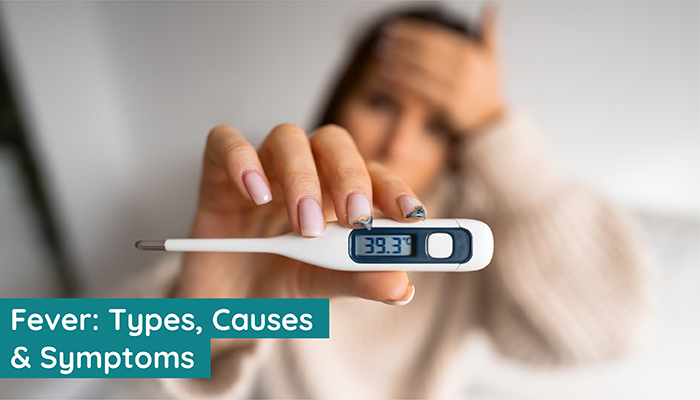A fever is a symptom of a disease or an indicator that the body is fighting off an infection or a virus. Fevers are essential in the battle against infections. Therefore, it is not a "bad" indicator. It is the transient rise in body temperature caused by a sickness or illness.
Thermometers offer the most precise reading of core body temperature.
The indication provided below are for healthy individuals, such as those who are not immunocompromised, are not on chemotherapy, and have not recently undergone surgery.
Symptoms of Fever
Body temperatures vary across individuals and during the day. The average temperature is 98.6 degrees Fahrenheit (37 C). Oral temperatures above 100 degrees Fahrenheit (37.8 degrees Celsius) are commonly considered fevers.Depending on the cause of a fever, other symptoms and indicators may include:
- Sweating, followed by chills & shivering
- Headache
- Body pain
- Loss of appetite
- Mood swings
- Dehydration
- General weakening
Taking temperature
When a child's temperature is at or above one of the following values, they have a fever:- In the mouth, the temperature was 99.5°F (37.5°C) (orally)
- Underarm temperature of 99°F (37.2°C) (axillary)
- When the temperature rises over 99°F to 99.5°F (37.2°C to 37.5°C), an adult most likely has a fever.
Causes of Feve
The equilibrium between heat production and loss determines the body's average temperature. The hypothalamus regulates homeostasis and is referred to as the body's "thermostat". Even in excellent health, your body temperature changes during the day. There may be cooler early temperatures and warmer late afternoon and night-time temperatures.The hypothalamus can raise the body's temperature when the immune system responds to an illness. The fever makes processes more difficult, which generates more heat and inhibits its elimination. Your body creates heat by shivering. By enveloping oneself in a blanket to protect against the cold, one assists the body in regulating its temperature. Virus-induced fevers below 104 degrees Fahrenheit (40 degrees Celsius) are mostly innocuous and may help the immune system combat illness.
There are several reasons of fever or a high body temperature, including:
- A viral illness
- Bacteria-based infection
- Dryness dehydration
- Certain inflammatory illnesses, such as rheumatoid arthritis–inflammation of the joint lining or synovium.
- A cancerous (malignant) tumour
Treatment for Fever
Doctors prescribe antibiotics medicine for fever. Most individuals feel better when they treat a fever, as it is accompanied by physical discomfort. However, depending on your age, health, and the underlying reason for your fever, you may or may not need medical therapy for the fever alone. Specialists feel that fever is the body's natural defence against illness. There are several non-infectious causes of fever as well. Treatments differ based on the underlying cause of the fever. For instance, doctors prescribe antibiotic tablet for fever to treat bacterial infections like strep throat.The most prevalent therapies for common medicines for fever are over-the-counter medications like acetaminophen and nonsteroidal anti-inflammatory medicine for fever like ibuprofen and naproxen. You must note that you cannot home-treat your children and adolescents with certain medications because they may cause complications and have harmful side effects.
General guidelines for medicines
There are two primary categories of over-the-counter fever reducers, such as acetaminophen. In the United States, Tylenol is the most popular brand name for the drug acetaminophen. Paracetamol is the most frequent brand name for the same medicine in many other nations like ibuprofen, aspirin, and naproxen. In general, none of these medications is superior to the others. Choose the medicine that will work well for you or your child by comparing the drug types, side effects, and other considerations. Here is the information you need to make an informed decision.Acetaminophen (Tylenol): Acetaminophen is an antipyretic and analgesic. It does not reduce inflammation or edema. Instead, it alters how the body perceives pain. Additionally, it helps cool the body to reduce fever.
Warning Signs for Fever
Be cautious not to take too much of the medicine, regardless of its name. Too much or too frequent use might be harmful to the liver, especially if you consume alcohol. And do not administer the adult dose to small children.What should I do now?
Having a temperature is often not a cause for concern. Understanding the fever treatment guidelines is essential, especially for young children, the elderly, and people with compromised immune systems. If you or one of your patients gets a fever, you must:- Ensure safety: Check if it is safe to manage this fever at home for an individual based on their age. Consult with a physician?
- Remain hydrated: Everyone can benefit from electrolyte and hydration replenishment.
- Keep track of the duration: No of your age, if your fever lingers for around two days, you should seek medical attention.
- Consult a physician: If you are unclear about how to treat a fever, consult your physician. Collectively, you can determine the best course of action.


